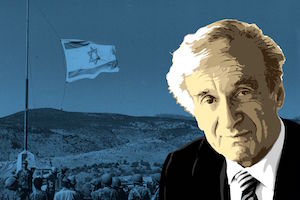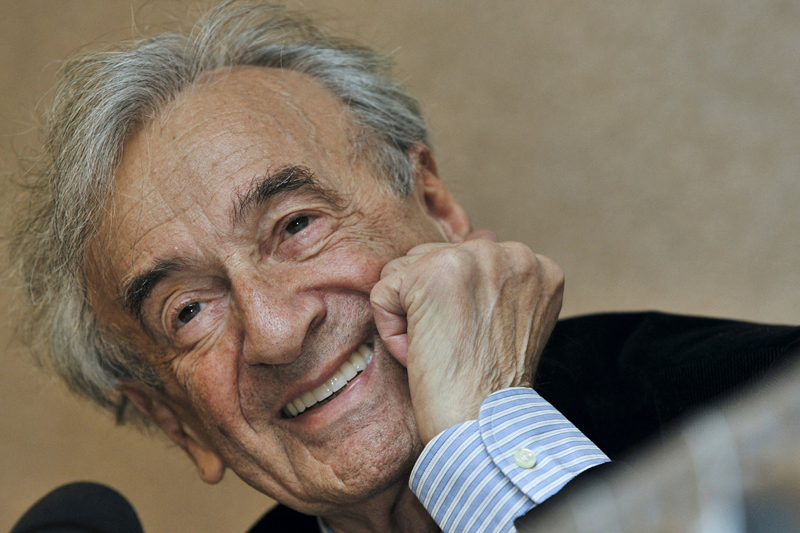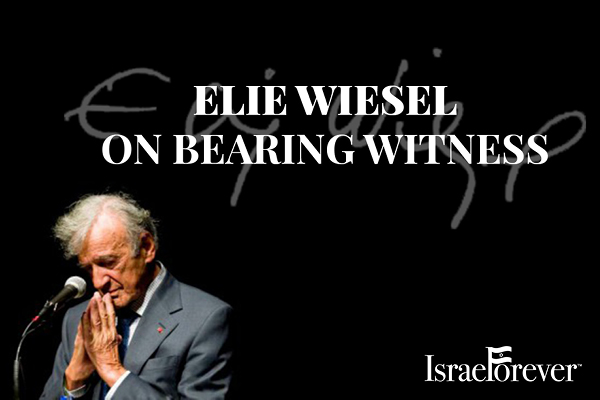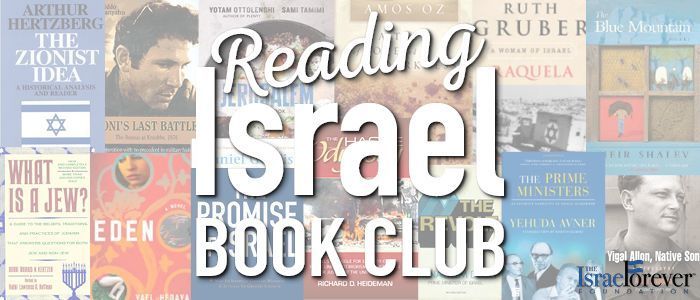Beggar in Jerusalem
by Elie Wiesel
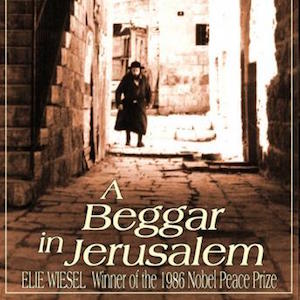
The year is 1967. The Six-Day War has Israel under threat, but the Jews win. The ancient western temple wall in Jerusalem is recovered. David, the novel’s narrator, a survivor of the Holocaust visits the reunited city of Jerusalem, and tells the story of both the personal struggle and the Jewish triumph reverberates with recollections and questions whose Holocaust-related themes shadow the victory.
At the Western Wall in the Old City, he encounters the beggars and madmen that congregate there every evening, who force him to confront the ghosts of his past and his ties to the present. In parable, spiritual exploration, archaic myth and surreal tableau, Wiesel juxtaposes the tough, pragmatic realities of the Six Day War with the ghosts of Jewish dead,"an echo of voices long extinguished."
Written with the same humane quality, the same mystical lyricism and generoud spirit that pervades much of Wiesel’s work. It expresses something of the relief felt in the Jewish world in 1967 when Israel overcame the threat of destruction from the Arab world initiated at Nasser's closing of the Suez Canal.
Taking place in the days following the Six-Day War, a Holocaust survivor visits the newly reunited city of Jerusalem. At the Western Wall he encounters the beggars and madmen who congregate there every evening, and who force him to confront the ghosts of his past and his ties to the present. Having joined the fight against the invading Arab armies, David meets Katriel at the front and they agree that whoever survives will tell the other’s story. Israel wins a resounding victory in what comes to be called the Six-Day War, and as the narrative opens, there are celebrations all over the land, especially in Jerusalem. Katriel, however, does not come back.
Among beggars, a tattered group beside the Wall, David hears tales, tells tales, waits for Katriel, son of a Rabbi and a link between ancient and new verities. In David's mind, persons living and dead merge, break apart and merge again until David understands the heart of suffering and loss.
David meets a group of beggars gathered near the Wailing Wall in Jerusalem as the sun sets. Each night they assemble to recount the stories of their lives and to boast of their roles in the recent spectacular victory. Dan, for example, tells of his kingdom beyond the mythical river Sambatyon, which throws up stones six days a week and rests only on the Sabbath. Moshe speaks of participating in a theological dispute with Christian priests sometime in the Middle Ages. Zalmen recalls a visit from his regimental commander just before the outbreak of hostilities; the commander is Judas Maccabaeus. Shlomo tells of meeting Jesus on the day He was crucified. Velvel boasts of securing the capture of Jerusalem by rejoicing: “Had I stopped, had I shed a single tear, we’d have lost the war....” His listeners dismiss this claim because each knows that he alone achieved the victory, Zadok by his prayers, Moshe by his singing.
David, who listens to all these stories, has two of his own to tell. One concerns his life, the other Katriel’s. David was born in Transylvania; when World War II breaks out, he becomes a refugee. After the war he returns to his native town, where once a large Jewish community flourished. Now only three Jews remain, and all are insane. Two imagine that they still see the old world; the third tells David that he knows he is possessed because he cannot see it: “Imagine my seeing this town without its Jews. It...
The novel moves back and forth from the Jerusalem of the present to the small Eastern European village world Wiesel lived in before the Holocaust. Despite its poetic and revelatory qualities, the story evokes something of the longing of hundreds of Jewish generations to return to their ancestral home in Jerusalem, and the land of Israel - and to dwell there in peace with their neighbors. It effectively gives some feeling of that great exaltation the Jewish world felt in 1967 at its escaping existential danger and returning to its holiest places.
Weaving together myth and mystery, parable and paradox, Wiesel bids the reader to join him on a spiritual journey back and forth in time, always returning to Jerusalem.

DISCUSSION QUESTIONS
- In the beginning of the book, David shares his purpose in joining the fight for Israel: he wishes to die in order to finally overcome the despair caused by God’s abandonment of the Jews during World War II and by his own pointless survival. How does this help us understand the ongoing struggles many Holocaust survivors faced?
- Wiesel writes of the survivors’ reality that, "unwanted everywhere, condemned to exile and reminding strangers everywhere of what they had done to us and to themselves. No wonder then that in time they came to reproach us for their own troubled consciences." At the end of World War II why couldn't Holocaust survivors immediately go to Palestine? Why might Wiesel have included the expanded description on the circumstances - their physical and mental state, the White Paper, etc - and the suffering it caused within the context of the Six Day War Jerusalem 20 years later?
- The Zionist dream was two-fold, the normalization of the Jewish people as a nation and the in gathering of the exiles. Now that Israel has become the nation of the in gathering of our people, to what extent has the normalization of our people occurred?
- In the end, David not only tells his comrade’s story—much as King David told of Absalom—but also wonders whether he ought to live it as well. This he does, at the end, by marrying Katriel’s widow, not out of love, which would imply a total gift of self and of which he does not feel himself capable, but rather out of affection and sympathy, perhaps out of friendship. How does this represent a self-discovery that carries David beyond the suffering and bitterness he has carried for so long?
- The main character recounts a conversation with his Hasidic master, for whom he had a question: “I can conceive of God’s wanting to punish us for reasons that are His and not necessarily ours; but why do entire nations, so many nations, aspire to become His whip, His sword?” The rabbi responds: “The Jews are God’s memory and the heart of mankind. We do not always know this, but the others do, and that is why they treat us with suspicion and cruelty. Memory frightens them. Through us they are linked to the beginning and the end. By eliminating us they hope to gain immortality. But in truth, it is not given to us to die, not even if we wanted to. Why? Perhaps because the heart, by its nature, by its vocation too, cannot but question memory. We cannot die, because we are the question.” What can we understand as Wiesel’s purpose in sharing this message?
WHAT READERS ARE SAYING
“In parable, spiritual exploration, archaic myth and surreal tableau, Wiesel, through the character of David, a wandering stranger in Jerusalem, adumbrates the tough, pragmatic realities of the Six Day war with the ghosts of Jewish dead...the intent and the passion is fixed and sustained.” - Kirkus Reviews
"This is a very deep book. It combines modern history and much legend about Jerusalem and the Jewish people. A must-have for all who love Jerusalem." - B. H.
"Elie Wiesel is perhaps the best author describing the Jewish experience writing today and one of the best ever. I would recommend reading as much of him as you can."
"Elie Wiesel has always had the uncanny ability to compassionately bring to life the horrific history that the Jewish people have suffered. His personal accounts and his novels return time and again to the mysteries of the Holocaust and the impact it has had on its survivors and the world in general. His novels are always lyrical in nature and disjointed in structure, moving between time and place with little distinction. "A Beggar in Jerusalem" may be the most unstructured novel that Wiesel has written, for it is a tale of a beggar who does not know any longer what is real and what is imaginary." - Michael B.
"It reads like a bit of a dream landscape. Everything just bleeds into everything else. It's more a painting than a read. I also didn't know if I was reading an abstract memoir or something meant to be purely surreal."
The Reading Israel Book Club's Book of the Month
Every month, the Reading Israel Book Club at Israel Forever brings you a new literary delight to grow your Israel connection through the written word.
We hope that you enjoy our selections and participate in discussion not only with your friends and family but with an international community of readers in our open discussion group on Facebook.

